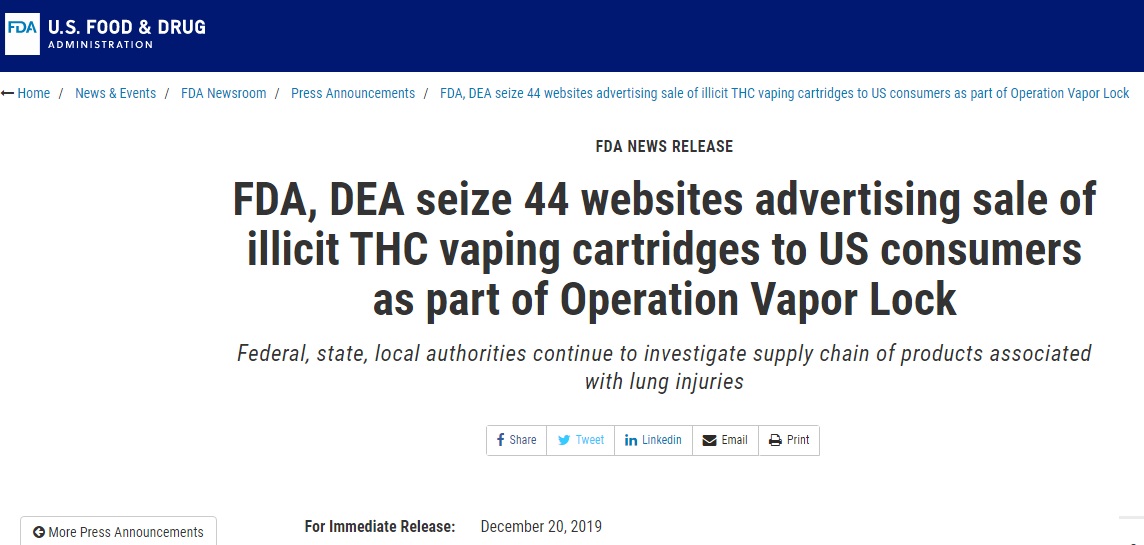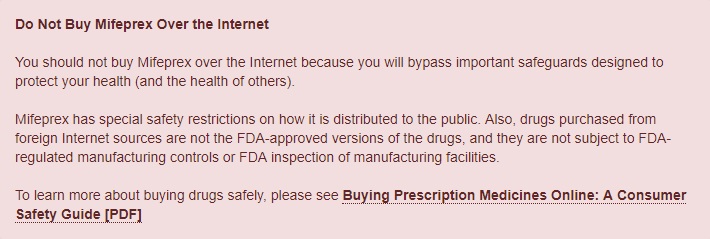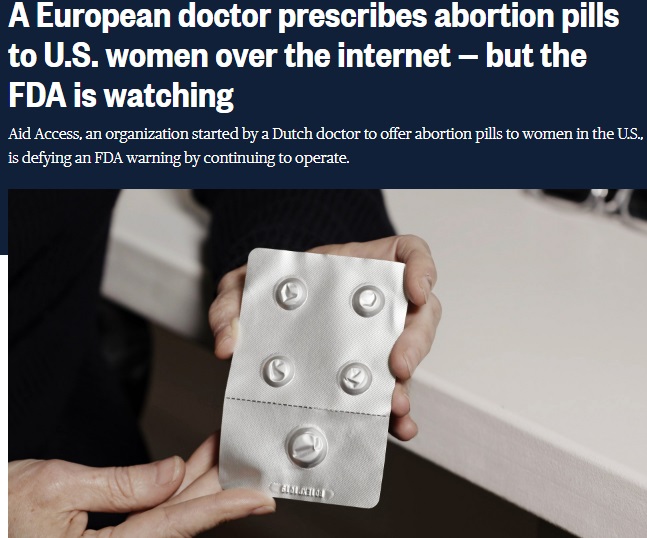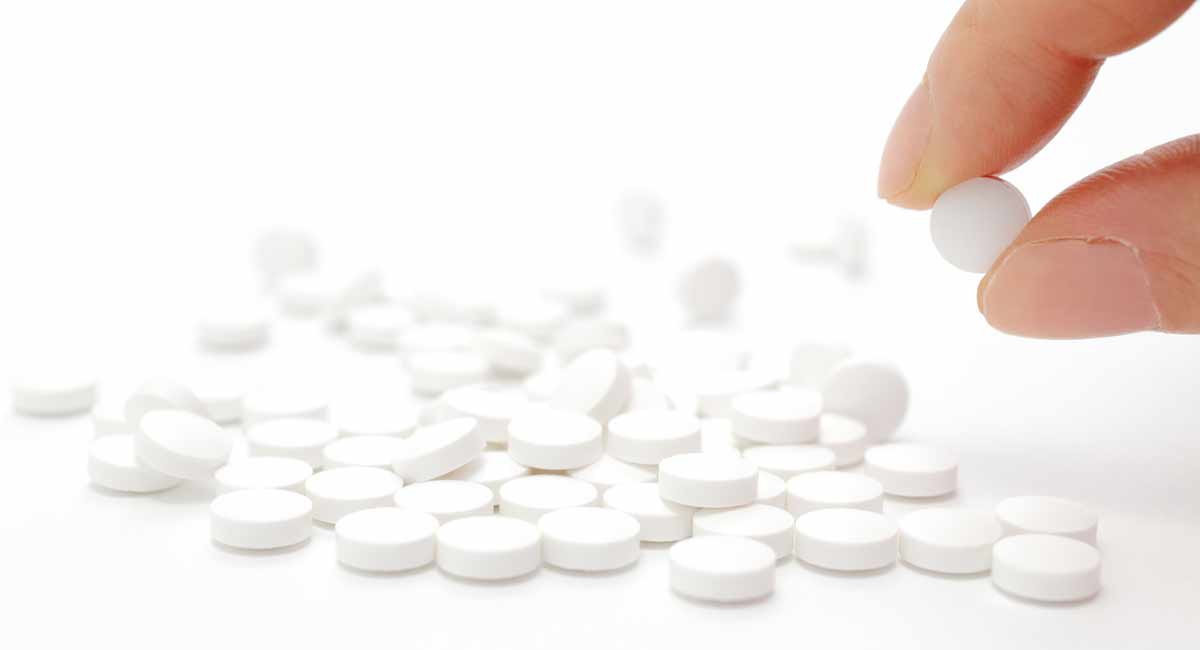In yet another example of pro-abortion hypocrisy, websites illegally dispensing the abortion pill remain active and online while websites illegally selling vaping products will soon be shut down by the FDA, which regulates both.
A recent press release noted that the DEA and FDA “seized 44 websites advertising the sale of illicit vaping cartridges containing tetrahydrocannabinol (THC)…. The action, which is part of Operation Vapor Lock, reflects ongoing work by federal, state and local authorities to investigate the supply chain of vaping products associated with recent lung injuries.” The FDA action took place despite the agency admitting, “To date, none of the products advertised on the 44 websites have been confirmed to be linked to any cases of lung injury….”
Under an FDA safety protocol called REMS, the abortion pill (which consist of mifepristone – or Mifeprex – and Misoprostol) can only be ordered, prescribed, and dispensed by and under the supervision of a hospital or clinic. In addition, there are requirements in place to confirm important details like gestational age and any possible ectopic pregnancies. Yet, today, websites clearly identified by the FDA as illegally dispensing the abortion pill online against the REMS requirements continue to operate with impunity.
Recently, illegal online abortion pill domains have popped up en masse, often defended by abortion advocates pushing for “self-managed” DIY abortion. Abortion advocates then advise women who experience complications after using illegally obtained abortion pills to present to the ER and claim they are suffering natural miscarriages. This, of course, means that any deaths or injuries are labeled as pregnancy/miscarriage complications instead of abortion pill complications. In 2018, the Charlotte Lozier Institute published a fact sheet exposing the reality that “72 unique websites” were selling the pills online. In April 2018, the pro-abortion Journal Contraception was able to “identif[y] 18 websites and order[] 22 [abortion pill products]… from online vendors.”

FDA to shut down websites selling illegal vaping
FDA warns illegal dispension of online abortion pills
- March of 2019, the FDA sent warning letters to AidAccess.org and Rablon for “causing the introduction of unapproved new drugs (including mifepristone for medical termination of early pregnancy) into U.S. commerce in violation of the Federal Food, Drug, and Cosmetic Act,” an FDA spokesperson told Live Action News.
- March of 2019, the FDA’s Health Fraud Branch sent an abuse complaint to Rebel Ltd., for websites that offered “misbranded and unapproved new drugs (e.g. a combination pack of mifepristone and misoprostol tablets, marketed as “Abortion Pill Pack”) for sale to U.S. consumers.”
The FDA told Live Action News in an e-mail that “failure to correct the violations of the law may result in FDA regulatory action, including seizure or injunction, without further notice.”

Image: FDA warns consumers to not buy abortion pills over the internet (Image: FDA)
What happened after FDA warnings were sent?
- Live Action News has previously documented that after the FDA sent a warning letter to Aid Access, the group announced its intent to defy the FDA’s warnings to “immediately cease” dispension of the drugs.
- In May 2019, 100 lawmakers sent a letter to the FDA requesting for the agency to monitor Aid Access for illegally dispensing abortion pills. The Congressional letter urged the FDA to “continue to conduct oversight” of Aid Access where pills are prescribed by an abortionist in the Netherlands and filled by a pharmacy in India.

NBC News report on Aid Access defying FDA warning to cease dispensing illegal abortion pill
In May 2019, the FDA told Live Action News, “We cannot comment on a potential future action at this time, but we remain very concerned about the sale of unapproved mifepristone for medical termination of early pregnancy on the Internet, because this bypasses important safeguards designed to protect women’s health. Unapproved drugs purchased from foreign internet sources are not the FDA-approved versions of the drugs, and therefore, they are not subject to FDA-regulated manufacturing controls or FDA inspection of manufacturing facilities. Drugs that have circumvented regulatory safeguards may be contaminated, counterfeit, contain varying amounts of active ingredients, or contain different ingredients altogether.”
FDA history of domain suspensions
The FDA encourages consumers to “[r]eport a website that you think is illegally selling human drugs, animal drugs, medical devices, biological products, foods, dietary supplements or cosmetics.” And the FDA has a history of seizing drugs and suspending or shutting down websites that violate their regulations… except, it seems, when the illegal pills are abortion drugs.
- 2012: FDA shutdown of more than 18,000 illegal pharmacy websites, seized $10.5 million worth of pharmaceuticals worldwide.
- 2013: FDA’s Office of Criminal Investigations, in coordination with United States Attorney’s Office for District of Colorado, seized and shut down 1,677 illegal pharmacy websites.
- 2014: Wall Street Journal reported, “FDA teamed with Interpol and dozens of countries to try to shut down more than 1,300 websites suspected of selling drugs without a prescription.”
- 2016: FDA took action against 4,402 websites that “illegally sell potentially dangerous, unapproved prescription drugs to U.S. consumers…. The FDA conducted extensive inspections at International Mail Facilities (IMFs) in coordination with U.S. Customs and Border Protection, and sent formal complaints to domain registrars requesting the suspension of the 4,402 websites.”
- 2017: Washington Post reported the FDA “targeted more than 500 websites it said were illegally selling unapproved versions of prescription medications… .The FDA… focused on websites that illegally sell opioids online and ship them through the U.S. postal system to U.S. consumers. The agency said it sent 13 warning letters to the operators of more than 400 websites and seized nearly 100 domain names….”
- 2018: During Operation Pangea XI, FDA sent warning letters to seven different networks… operating… 465 websites offering misbranded and unapproved drugs to U.S. consumers. More than 450 domain names were brought to the attention of search engines and the appropriate domain name registries and registrars. FDA investigators found products attempting to make their way into the country from places such as India, the United Kingdom, China and El Salvador; 794 products were refused entry into the U.S.
While we wait for the FDA to seize illegally dispensed abortion drugs or suspend their websites, Aid Access admitted that in 2018, the group reportedly filled 2,500 prescriptions of the illegal abortion pills, filled by a “pharmacy in India.” A lawsuit later filed by the group noted it had actually shipped 7,131 abortion pills to women in the U.S. between March 30, 2018, and August 27, 2019, well after the FDA’s warning letter was sent — a deliberate violation of the FDA demand.

Aid Access responds to FDA warning letter admits illegally dispensing abortion pills
According to an October 2019 article published by the New York Times, “Nearly 1,300 people, disproportionately young, have been sickened from vaping THC, nicotine or both. At least 29 have died.” Yet, in 2018, the FDA updated its adverse effects reports on just legally dispensed abortion pills, revealing 24 deaths of women associated with the abortion pill since its approval. The report documents that legally dispensed abortion pills have caused nearly 4,200 reported adverse effects, including 1,042 hospitalizations, nearly 600 instances of blood loss requiring transfusions and other serious complications. But, as Live Action News previously noted, under 2016 changes, abortion pill manufacturer DANCO no longer has to report non-fatal adverse effects, so we can only imagine what the number really is.
Editor’s Note, 4/18/21: The FDA has received reports of serious adverse events in women who took Mifeprex. As of December 31, 2018, there were reports of 24 deaths of women associated with Mifeprex since the product was approved in September 2000, including two cases of ectopic pregnancy resulting in death; and several cases of severe systemic infection (also called sepsis), including some that were fatal.
The adverse events cannot with certainty be causally attributed to mifepristone because of concurrent use of other drugs, other medical or surgical treatments, co-existing medical conditions, and information gaps about patient health status and clinical management of the patient. A summary report of adverse events that reflects data through December 31, 2018 is here.
“Like” Live Action News on Facebook for more pro-life news and commentary!







